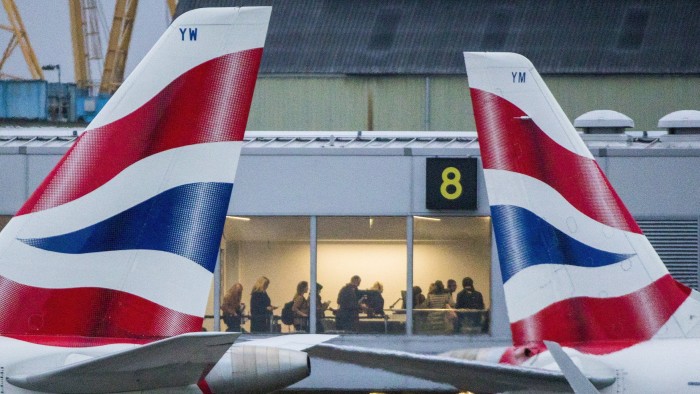Stay informed with free updates
Simply sign up to the Airlines myFT Digest — delivered directly to your inbox.
Virgin Atlantic is targeting frequent flyers who have lost out from controversial changes to the British Airways loyalty programme, in the latest salvo in a decades-old rivalry between the two carriers.
The airline, which is majority owned by billionaire Sir Richard Branson’s Virgin Group, said it would match the status of BA “gold” and “silver” executive club members if they switched to its loyalty programme.
The changes “make it easy for customers who are not feeling the love from their existing airline to experience the award-winning hospitality of Virgin Atlantic,” said Anthony Woodman, the executive in charge of Virgin’s “Flying Club” loyalty programme.
In an attempt to target disaffected BA customers, Virgin said it would, until February 14, give five customers who “status match” 1mn of its air miles, enough to fly from London to the east coast of the US 10 times.
BA sparked criticism from many customers last month when it announced sweeping changes to its loyalty points system in which passengers earn rewards such as free seat selection and access to the airline’s lounge.
Under the changes, which will be introduced from April, “tier” points will be awarded based on the cost of flights or package holiday bookings instead of the class of travel and the length of trips.
To reach the coveted “gold” status passengers will now have to spend around £20,000 per year flying with BA.
The tier points system is separate from the Avios loyalty currency that can be spent on flights and holidays.
Many frequent flyer experts said the changes meant BA was in effect pricing out most leisure travellers from the higher tiers of its loyalty programme.
But some customers welcomed the move, which will bring BA into line with many of its rivals and better reward passengers who spend the most with the airline.
Gilbert Ott, of frequent flyer website God Save The Points, said a growing number of airlines were using status matches to grow their customer base, but that Virgin’s was a particularly “aggressive offer”.
“When airlines smell discontent, they extend these warm and fuzzy offers to customers looking for new love,” he noted in a blog post. Similar to getting people to switch banks, convincing premium travellers to swap airlines was not simple, but “immediate access to the ‘good life’ is a clever enticement,” he wrote.
BA said status matching was common practice in the travel industry. “Our customers who opt into those of other airlines retain their status with us and continue enjoying the benefits we offer such as lounge access and priority boarding, seat selection and bonus Avios.”
With 45 aircraft, Virgin is a far smaller airline than BA, which has more than five times as many. But Virgin focuses its flying on the transatlantic market, which is also BA’s main profit engine.
Its offer is extended to customers in the top tier of 11 airlines, which includes American Airlines, Cathay Pacific, Emirates and Lufthansa.
BA and Virgin have sparred since Branson’s carrier launched in the 1980s, and Branson successfully sued BA in the early 1990s over a “dirty tricks” campaign to win customers.
The rivalry, while still intense commercially, has been less heated in recent years and the two businesses worked closely together during the pandemic to push for the end of government travel rules.
Read the full article here

